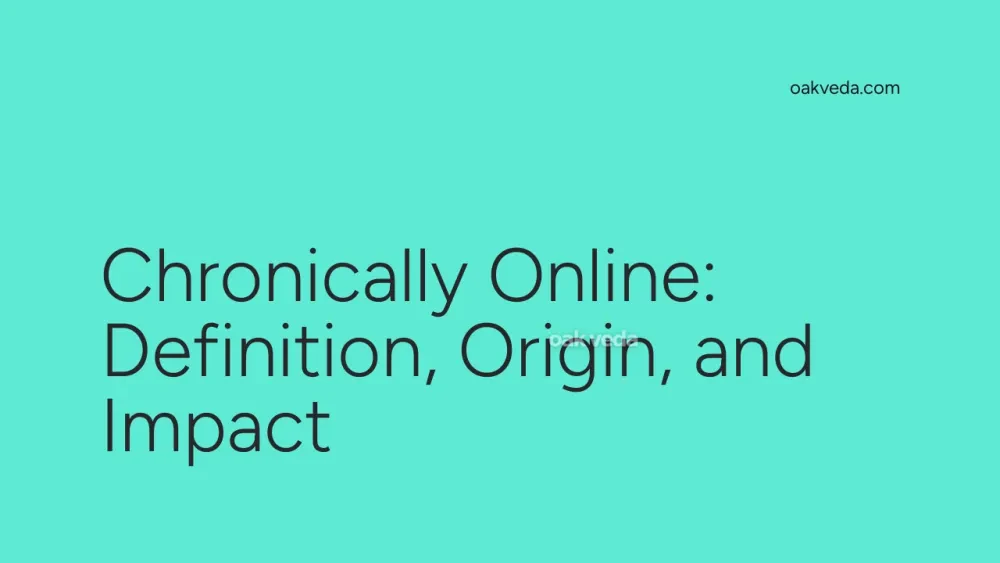
What is Chronically Online?
"Chronically online" is a term used to describe individuals who spend an excessive amount of time connected to the internet and social media platforms. These people are constantly engaged with digital content, often to the point where their personality and interactions are heavily influenced by internet culture, memes, and online slang.
Origin and Development of Chronically Online
The phrase "chronically online" emerged as a response to the increasing prevalence of internet usage in everyday life. As social media platforms and smartphones became ubiquitous, the line between online and offline existence began to blur for many users. This term gained traction in the late 2010s and early 2020s, particularly among younger generations who grew up with constant internet access.
How Chronically Online Behavior Manifests
Chronically online individuals often exhibit the following behaviors:
- Constant checking of social media notifications
- Difficulty disconnecting from digital devices
- Extensive knowledge of internet memes and trends
- Using online slang in real-life conversations
- Prioritizing virtual interactions over face-to-face communication
- Sharing personal experiences primarily through social media posts
Impact of Chronically Online Behavior on Mental Health
The effects of being chronically online on mental health can be significant:
-
Social Isolation: Excessive online engagement can lead to reduced real-world social interactions, potentially causing feelings of loneliness and isolation.
-
Anxiety and Depression: Constant exposure to curated online content can create unrealistic expectations and contribute to low self-esteem, anxiety, and depression.
-
Sleep Disruption: Late-night scrolling and the fear of missing out (FOMO) can interfere with healthy sleep patterns.
-
Attention Span Issues: The rapid consumption of short-form content may lead to difficulty focusing on longer tasks or conversations.
-
Information Overload: Continuous exposure to news and information can result in mental fatigue and increased stress levels.
How Chronically Online Behavior Shapes Social Media Culture
The prevalence of chronically online individuals has significantly influenced social media culture:
- Rapid Trend Cycles: Memes and trends spread and evolve quickly, creating a fast-paced online environment.
- Language Evolution: Internet slang and memes have become integral parts of everyday communication, even offline.
- Content Creation: There's an increased demand for constant, bite-sized content to satisfy the chronically online audience.
- Online Communities: Niche groups form around specific interests, fostering a sense of belonging for chronically online users.
Controversies Surrounding Chronically Online Behavior
The concept of being chronically online has sparked debates about:
- Digital Addiction: Whether excessive internet use should be classified as a formal addiction.
- Privacy Concerns: The implications of sharing extensive personal information online.
- Authenticity: The balance between curated online personas and genuine self-expression.
- Productivity: The impact of constant connectivity on work and academic performance.
How Brands and Influencers Leverage Chronically Online Culture
Marketers and content creators have adapted to the chronically online audience:
- Real-time Engagement: Brands maintain active social media presences to interact with consumers instantly.
- Meme Marketing: Companies incorporate popular memes and internet humor into their advertising strategies.
- Micro-content: Short-form videos and posts cater to shorter attention spans.
- Always-On Campaigns: Marketing efforts are designed to maintain constant engagement with the target audience.
Future Trends Related to Chronically Online Behavior
As technology continues to evolve, we can expect:
- Increased Integration: Further blending of online and offline experiences through augmented and virtual reality.
- Mental Health Focus: More emphasis on digital well-being features and apps to combat negative effects.
- New Platforms: Emergence of social media platforms designed to address the needs of chronically online users.
- Education: Greater focus on teaching digital literacy and healthy online habits in schools.
FAQs about Chronically Online Behavior
Is being chronically online the same as internet addiction?
While there's overlap, being chronically online doesn't necessarily equate to addiction. It refers to a lifestyle heavily integrated with internet culture, which may or may not be problematic for the individual.
How can I reduce my chronically online behavior?
Try setting designated offline times, engaging in physical activities, practicing mindfulness, and gradually reducing screen time. Apps that track and limit device usage can also be helpful.
Can being chronically online affect relationships?
Yes, it can impact relationships by reducing face-to-face interactions and creating a preference for digital communication over in-person connections.
Are there any positive aspects to being chronically online?
Some benefits include staying informed, maintaining long-distance relationships, and having access to diverse perspectives and information. However, moderation is key to avoiding negative consequences.
In conclusion, the phenomenon of being chronically online reflects the deep integration of internet culture into modern life. While it offers unprecedented connectivity and access to information, it also presents challenges to mental health and social dynamics. As we continue to navigate this digital landscape, finding a balance between online engagement and offline experiences remains crucial for personal well-being and healthy social interactions.
You may be interested in:
- SMB: Definition, Origin, and Impact on Social Media Marketing
- "I'm Baby": Definition, Origin, and Impact
- Tube Girl: Definition, Origin, and Impact on Social Media
- Target Audience: Definition, Origin, and Impact on Social Media
- Aesthetic: Definition, Origin, and Impact on Social Media
- DC (Dance Credit) on TikTok: Definition, Origin, and Impact

